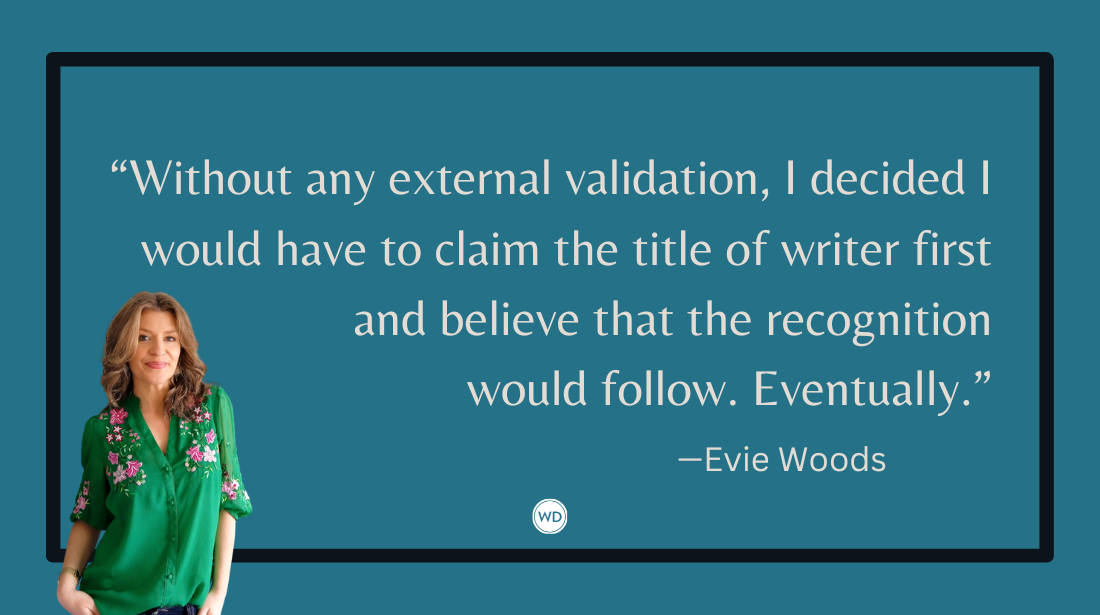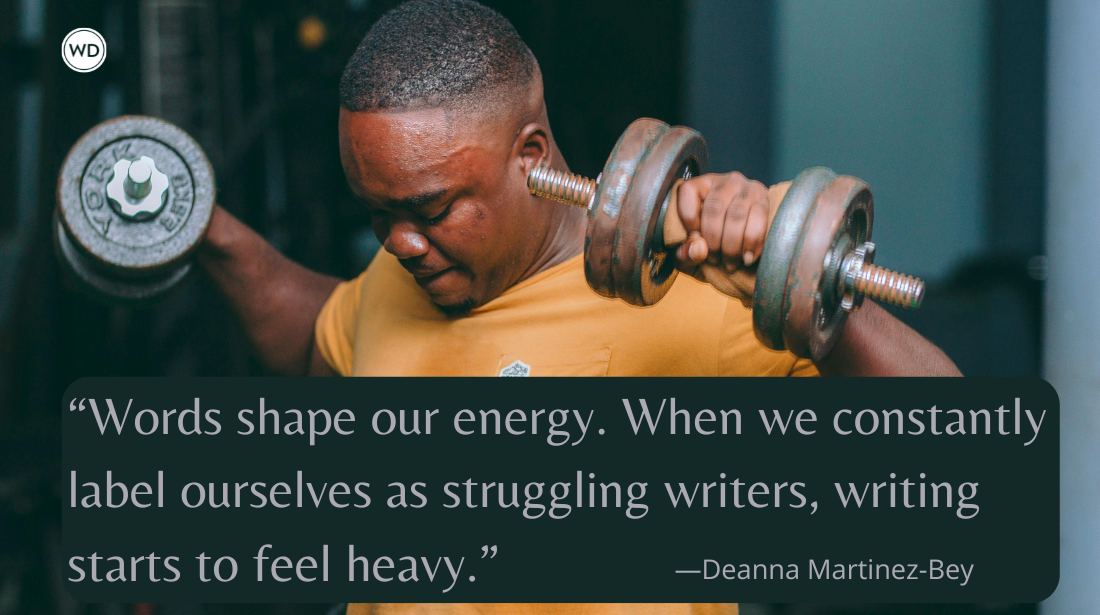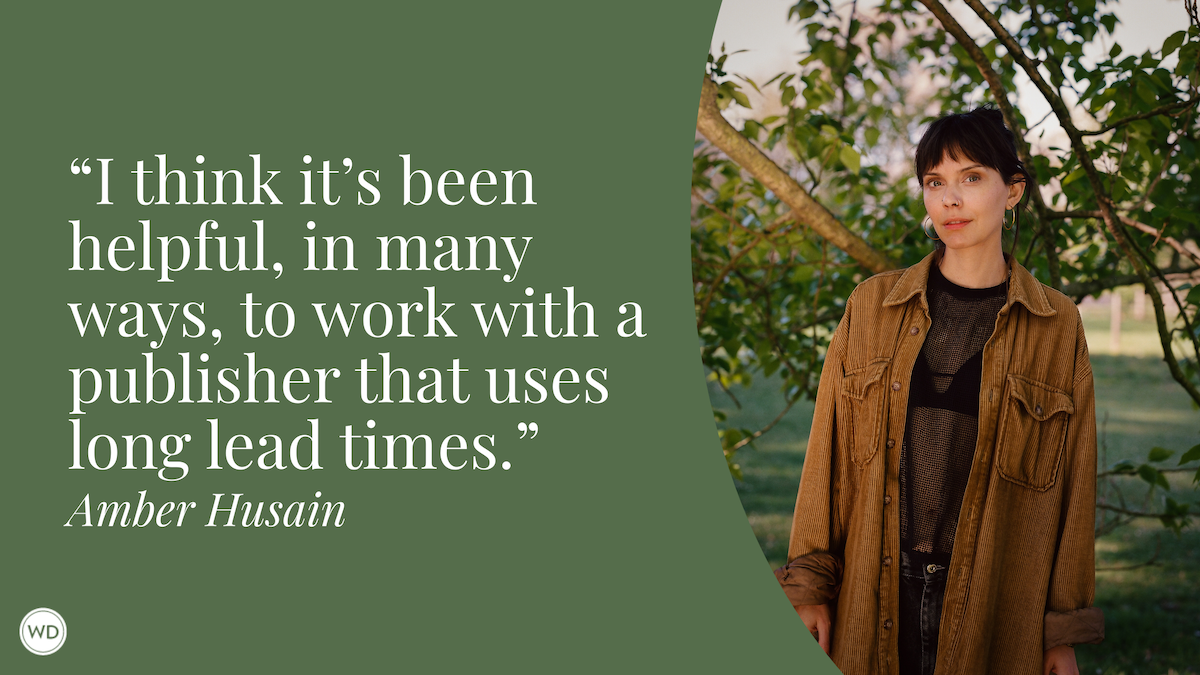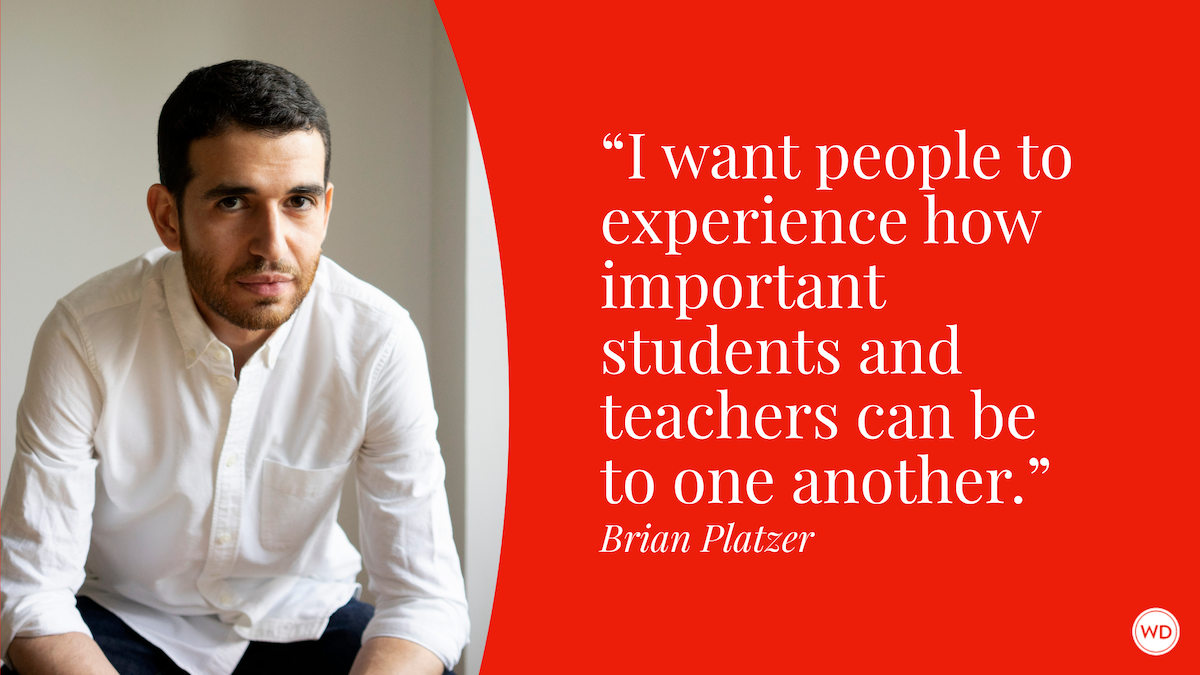Breaking In: May/June 2025
Debut authors: How they did it, what they learned, and why you can do it, too.
WD uses affiliate links.
Tamla T. Young
Ready, Set, Mango!
(Picture book, April, OwlKids)
“Two competitive cousins are in for a surprise as they fight to find the perfect fruit.”
Writes from: Toronto, Canada.
Pre-Mango: My family and I had taken a trip to Portugal for Christmas and New Year’s in 2016. At the stroke of midnight, while floating along the Tagus River (keeping with Portuguese tradition) I ate 12 raisins, drank 12 sips (maybe more) of champagne, and made 12 wishes. One was to have a baby and another was to become an author of books for children.
When my son was born on the last day of 2017, I took it as a sign. I started a blog, 12 Raisins, to document my writing journey while juggling life as a teacher and a new mom. Determined to make my dream a reality, I enrolled in my first picture book writing course at the University of Toronto’s (UofT) School of Continuing Studies in the summer of 2018.
Time frame: Ready, Set, Mango!, (formerly Beautiful Pebbles) was written during a one-week intensive course at UofT’s Summer Writing School. My cousin—whom I hadn’t seen in decades—visited from Florida. Unfortunately, because of the course, our schedules didn’t align very well, and I didn’t get to spend as much time with her as I’d hoped. Fortunately, however, her visit sparked a flood of memories from our childhood. One, in particular, stood out, and by the end of the course, it had transformed into the story that would become my debut picture book.
Enter the agent: I am currently unagented but hope to be agented soon. I came about this deal because I attended a virtual CANSCAIP PYI (Packaging Your Imagination) conference for children’s authors, illustrators, and performers in October 2021. I booked a 1:1 manuscript critique with Owlkids editorial director, Jennifer Stokes. She liked the story and asked if I’d be interested in continuing to work on it with her. I said, “Yes, of course!” With her feedback, I revised a few drafts, and in February 2022, she let me know that she saw something in the story and that she wanted to see it published. I revised one or two more drafts, and in May 2022, without making any promises, she let me know that she was going to pitch it to the Editorial Board. In June 2022, I was informed that Ready, Set, Mango! had been acquired and was greenlit for publication for Spring 2025.
Biggest surprise: I knew the publishing process took a long—but I didn’t realize just how long. What amazed me even more was the number of people involved in bringing a book to its highest potential. From editors to designers to marketing teams, each person played a crucial role. Many of whom I will likely never meet. I found comfort in knowing that so many skilled professionals were focused on aspects of my book that I knew little about, all working together to ensure its success.
What I did right: Looking back, I didn’t just make a wish—I took action. I wrote. I kept writing, and I intentionally placed myself in environments that would challenge and nurture my craft. Early on, I recognized the importance of seeking out and inserting myself into writer spaces such as classes, workshops, conferences, etc. Spaces that encouraged growth, learning, and most importantly, belief in myself as a writer.
What I would have done differently: I truly believe that everything happens in its own time. But if I could change one thing, I would have seen myself as a writer starting earlier. I would have kept writing creatively beyond elementary school. Back then, I published my first books at my school's Whiska’s Publishing House and even won creative writing awards—yet, for some reason, never fully embraced the idea that I was a writer.
Platform: Along with my blog, 12 Raisins, I started an Instagram page in 2018 and have maintained a small but steadily growing following. Social media has never been my forte, and my presence has ebbed and flowed over the years. Now, I’ve added a Bluesky page to the mix and am still figuring out how it works.
Advice for writers: Don’t stress about other writers’ processes—your process is your process. Some wake up at 4 am and write for hours, while others aim for 1000 words a day. Some have dedicated offices; others write in cafés, libraries, or on park benches. Some draft quickly while others stew (I’m a stewer). Some writers write in their heads for weeks, months, or maybe even years. Some begin the writing process with their characters while others plot and plan. As long as you are engaged in creating your story, however that process might look, it’s all good. Take classes, share your work, and find what works for you—then roll with it.
Next up: I have four manuscripts looking for the right home—and many more ideas waiting to be fleshed out. My goal is to become the prolific children’s book writer I aspire to be.
Website: tamlatyoung.com
Jemimah Wei
The Original Daughter
(Literary fiction, May, Doubleday Books)
"The Original Daughter is about two sisters, one adopted, growing up in the rapidly modernizing Singapore, inseparable until they become violently estranged on their journey to achieve fame and fortune."
Writes from: Between Singapore and the United States.
Pre-Daughter: I’d been living in Singapore and working insane hours as a freelancer, which made writing very difficult, psychologically, despite doing it constantly. Eventually, I hit a pretty desperate wall, and in 2019 put my entire life on hold to relocate to the States for my MFA at Columbia—only to get bumped back to Singapore by the pandemic. I started publishing pissed off pandemic fiction in 2020 because I was losing my mind. I had a few flash pieces picked up, had my first full-length story published with a prize, and started a pandemic column for the magazine No Contact, which ran for about two years. When I finally got back to the States in August 2021, I was ravenous for a fully committed writing life, in all senses of the word. I kept strict writing hours while completing my MFA, was publishing quite frequently, and developed a strong community of writers and friends. Then I got the Stegner, moved to California, and did the same till the book was ready to go.
Time frame: I started this book in 2014, and it took nine years to finish it—and by finish, I mean get it to a place I felt happy with, enough to start letting other people in. And then I did another year of edits with my agent, then editor, and it’ll be out in 2025, a full 11 years after I wrote the first word!
I finished my first actual draft in April 2021, but the Stegners were the first people who read a draft in full, in March 2023. That was maybe the most terrifying moment of the journey for me—the exposure to air after years of a book being completely insulated and labored on in private. We sat together and workshopped it, and it went really well, but by the end of two hours I was shaking so hard from nerves and adrenaline that my friend Ashley Hand (Land of Enchantment, forthcoming with Scribner) had to cram pizza in my mouth to get sugar in my system! Then I cried from relief and we all flew to AWP that very night.
Enter the agent: After the Stegners read the book, I spent another six weeks doing revisions. I was preparing to query and had a list of agents who had either solicited me based on my published stories, or who I admired and wanted to shoot my shot with, but as far as I knew the Wylie Agency didn’t take unsolicited submissions, so I didn’t think it was an option to query them. But right before I queried, a mentor, the author Tash Aw, reached out to ask if he could introduce me to his agent. I’ll always be grateful for the connection, because I loved getting coffee with Jackie, and subsequently queried her along with the larger list. I spent a couple of weeks having conversations with different agents after going out, but was so struck by the way Jackie met the book on a deeply existential level, that at some point I just knew. It’s been a wonderful, wonderful journey thus far, and I’m so happy to be working with her—Jacqueline Ko at the Wylie Agency.
Biggest surprise: I’m surprised by how publishing a book changes your fundamental relationship to time. I knew the statistical fact of most books taking two years from sale to publication, but the time truly vanished so quickly. I’m also surprised by the peace this process has brought me—the writing process was full of anxiety, so I’d assumed I would be all nerves with publication too, but somehow I feel like completing the book has gifted me a new stage of my relationship to writing, where I’m able to respect the book as a subject with its own integrity separate from my overall body of work as an artist. It’s a truly incredible thing to experience, especially when you’ve been laboring on one book for so long that your artistic identity can start to feel codependent with that work.
What I did right: I wore my heart on my sleeve. I moved across continents to New York knowing nobody, but I was obsessed with writing and reading, and loved, like really, really loved getting into rabbit hole conversations about books. In hindsight, maybe it was a bit intense, but it made it easy to find people who were attracted to the same things. We use words like community a lot, but to me, it really just meant having friends and mentors to live through this journey with, and relying on one another through excitement and hardship, which has been invaluable.
What I would have done differently: Gotten a therapist earlier.
Platform: In my previous career, I did a lot of screenwork, and social media feels very companiable to me. I remember quite viscerally the early days of the social Internet, the strange dance with familiarity and anonymity, parceled vulnerability that often came with genuine connections—and the turn to identity commodification and commercialization. It’s something the characters navigate in The Original Daughter too—what it means to form and perform a self in an evolving, modernizing digital age. Personally, since I’ve been pretty open with my writing journey over the last decade, I’m very lucky to already have long-term readers back home who I chat with online about books, writing, and eggs. Part of publishing internationally feels to me like I’m just expanding that existing conversation on my digital platforms.
Advice for writers: So much of writing is navigating that relationship to yourself as an artist. I was unnecessarily stressing myself out about the book taking so long, when the Singaporean novelist Rachel Heng (The Great Reclamation, Riverhead) passed on advice she got from her mentor—that nobody ever read a book they loved and thought, wow, I wish this came out last year. That really clicked for me, psychologically. The book takes the time it takes, and we can choose to treat ourselves with kindness or beat ourselves up over it. In the long run, one is definitely more sustainable.
Next up: I’m working on my next novel, about parallel worlds and lives and skincare. Ish.
Website: JemmaWei.com
Kimm Topping
Generation Queer: Stories of Youth Organizers, Artists, and Educators
(Young adult nonfiction, May, Lee & Low Books)
“The first collection of illustrated biographies featuring LGBTQ+ youth activists who are leaders in social change.”
Writes from: Boston, MA.
Pre-Generation: My background is as a youth worker, community organizer, and educator. I met so many students and educators who needed a resource like this, and it’s the book I wish I had as a queer, trans young person. I’ve always loved writing, and the ways I’ve mainly channeled that in my career are by writing about history. Before this, I wrote a series of historical tours (Mapping Feminist Cambridge) that tell the stories of feminist activists from the 1970s–1990s in Cambridge, MA. I’m deeply passionate about opportunities to record and share people's stories—and help others see themselves in those stories.
Time frame: I started writing this book in the summer of 2019, so it’s a long time in the making. Some of the first people that I interviewed are now well into their adulthood! Of course, COVID interrupted the timeline—and in many ways, I’m grateful that it did. By the time I got to the final draft, I was organizing nationwide protests with a group called Queer Youth Assemble. We marched in D.C., and they coordinated protests in every state across the country, led by youth. The original proposal for Generation Queer had the three core biography chapters, but because this organizing was happening during its writing, I decided to add an entirely new chapter. I think this really helped to shape a central message of the book—that organizing is collective, not individualistic or about one person. The chapter also features examples of other major protests and organizing strategies, so I’m really happy with how it rounds out the book.
Enter the agent: Lauren Scovel of Laura Gross Literary Agency. I was introduced to Lauren by my writing coach at the time, E.B. Bartels, an instructor at GrubStreet in Boston. Lauren has been an incredible advocate for this book and for my work. Especially as a debut author, it has been so meaningful to have Lauren’s advice and encouragement along the way.
Biggest surprise: Learning the lingo! Like I said, I come from an organizing/education background, so I didn’t have much information on the process of publishing or editing. I had to google a lot of editing language, publishing industry terms, etc. I learned a lot from my editor, Stacy Whitman, which ultimately shaped the book in a new direction with added sidebars, educational tools, etc. She helped me transform my vision of this being not only a book for young adults, but for educators and youth workers, too.
What I did right: Ask for help. I had this idea for years, and I wasn’t sure where to start. When I finally signed up for a GrubStreet class, that made everything possible. I also received a GrubStreet scholarship, which was phenomenal, because as someone who is a first-generation college student and has been juggling multiple jobs as both a teenager and adult, accessing professional development like that has always been a challenge. That course helped me write the first proposal, and the instructor’s feedback brought it to the next level, so it was agent-ready. I also didn’t steer away from my roots as a youth worker/organizer in the writing of this. I’m so happy that I ended up working with Lee & Low Books—that was my dream publisher from the start because their stories center and prioritize BIPOC youth. Having a publisher that understood the importance of this book, at this time, was so crucial. They also understood my voice and perspective, and helped me get this book to exactly where I hoped it would be and beyond.
What I would have done differently: Connect with other authors. Early on, I felt really shy to reach out to authors that I admired who were writing about similar topics. I wish I had reached out sooner to see that they’d gone through similar things. Now, as I’m getting ready for the promotion of my book, I have meetings set up with other authors or people in the field as a way of supporting each other. Especially with the current political attacks on trans people, remaining connected to community and resources is so needed.
Platform: A little bit, but this was definitely something I was worried about when we first pitched the book. I had a small following on social media, but in the proposal, I focused more on my work and how it related to my desire to write this book. I had been working for 8 years in non-profits and community organizing in the Boston area.
Now that I understand the publishing industry more, I’m taking a lot of steps to be proactive in building relationships with bookstores and national organizations. My main goal in this work is to reach LGBTQ+ youth with stories and resources that help them survive, thrive, and feel connected. So, I’m really looking forward to visiting more GSAs, youth organizations, schools, and queer bookstores with the promotion of this book and future projects.
Advice for writers: Read, read, read!! I’ve been obsessed with all things gender/sexuality nonfiction for many years. As a young adult, I’d run to the gender section in Barnes and Noble. Back then, it was tiny, and now it’s growing so quickly. I love going to the local bookstore and seeing what new books are out, and reaching out to those authors to learn more about their work. Understanding who the other authors are in your genre/topic is so beneficial, because they will soon be your colleagues!
Next up: I’m currently working on a few projects that also highlight LGBTQ+ history and hope to break into memoir/creative nonfiction in the near future!
Website: KimmTopping.com
To see more from this issue, visit the Writer's Digest Shop to get your digital copy today!









